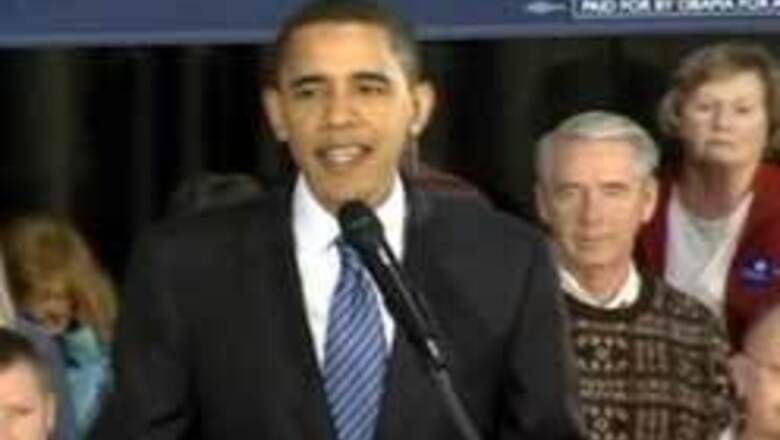
views
Washington:> Senator Barack Obama claimed victory in North Carolina on Tuesday, but the contest in Indiana was too close to call.
Early returns in Indiana showed Senator Hillary Clinton with a commanding lead, but as results came in through the evening, that lead narrowed considerably.
With 85 per cent of Indiana precincts reporting, Clinton was ahead of Obama, 52-48 per cent.
There are 72 delegates at stake in Indiana.
Obama congratulated Clinton on what he called her apparent victory there.
He thanked his supporters in North Carolina after they handed him a decisive win. With more than 60 per cent of precincts reporting, Obama held a 14-point lead over Clinton.
The win will give him the larger share of the state's 115 delegates.
"Some were saying that North Carolina would be a game-changer in this election. But today, what North Carolina decided is that the only game that needs changing is the one in Washington," Obama told supporters in Raleigh, North Carolina.
Obama took an overwhelming 91 per cent of the black vote in North Carolina, according to exit polls, while Clinton claimed only 6 per cent.
Clinton took 59 per cent of the white vote compared to 36 per cent for Obama, according to the polls.
Poll workers in Indiana and North Carolina reported heavy turnout in the two primaries.
Turnout in the North Carolina Democratic primary was expected to reach 50 per cent, according to Gary Bartlett, executive director for the North Carolina Board of Elections.
That figure would far exceed the 15 per cent to 30 per cent that usually turn out for a primary, he said.
The Indiana secretary of state's office said turnout was high throughout the day.
Indiana Secretary of State Todd Rokita will not release official figures until the end of the day, but said turnout looked more like a general election than a primary.
A judge ordered some polling stations in Indiana to stay open past closing time because the lines were so long.
Polling officials in Indianapolis said they had set a record for voter turnout after being open for only six hours.
According to early exit polls, half of Clinton's supporters in Indiana would not vote for Obama in a general election match up with Senator John McCain, the presumptive Republican presidential nominee.
A third of Clinton voters said they would pick McCain over Obama, while 17 per cent said they would not vote at all.
Forty-eight per cent of Clinton supporters said they would back Obama in November.
Obama got even less support from Clinton backers in North Carolina where 45 per cent of Clinton supporters said they would vote for him over McCain. Thirty-eight per cent of Clinton supporters said they would vote for McCain while 12 per cent said they would not vote.
Obama voters appear to be more willing to support Clinton in November. In Indiana, 59 per cent of Obama backers said they'd vote for Clinton, and 70 per cent of Obama backers in North Carolina said vote for her against McCain.
PAGE_BREAK
Obama on Tuesday said he didn't agree with those who said his party would not be able to unite.
"Tonight, many of the pundits have suggested that this party is inalterably divided -- that Sen. Clinton's supporters will not support me, and that my supporters will not support her," he said.
"I'm here tonight to tell you that I don't believe it. Yes, there have been bruised feelings on both sides. Yes, each side desperately wants their candidate to win. But ultimately, this race is not about Hillary Clinton or Barack Obama or John McCain.
"This election is about you -- the American people -- and whether we will have a president and a party that can lead us toward a brighter future."
Voters from both states were spilt over the controversy surrounding Obama's former pastor, the Rev. Jeremiah Wright, early exit polls suggest.
In Indiana, 49 per cent of voters in the Democratic primary said the issue was not important, compared to 48 per cent who said it was an important factor in their vote.
In North Carolina 50 per cent of voters said the Wright controversy was important, and 48 per cent said it was not.
In both states, those who said it was an important issue largely broke for Clinton, and those who said it was not backed Obama.
Obama currently leads in pledged delegates and in states won, and he is ahead in the popular vote, if Florida and Michigan are not factored into the equation. Those states are being penalized for moving their primaries up in violation of party rules.
In all, only 404 pledged delegates remain to be chosen, and Tuesday's total of 187 makes it the biggest single primary day left. Clinton would need to win 70 per cent of the remaining pledged delegates to catch up with Obama.
With neither candidate expected to win the 2,025 delegates needed to clinch the Democratic nomination by June 3, the end of the primary season, the final decision will most likely fall to the 796 superdelegates: Democratic governors, members of Congress and party officials.
Both candidates have spent the past two weeks shuttling between Indiana and North Carolina, each arguing to crucial working-class voters that their rival is out of touch when it comes to the pocketbook issues that are dominating the campaign.




















Comments
0 comment